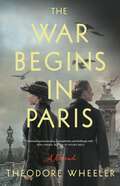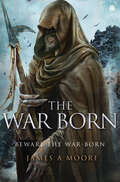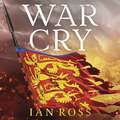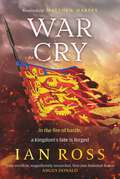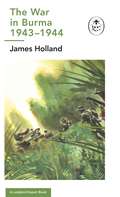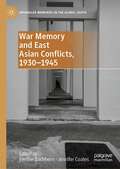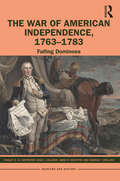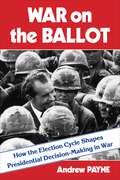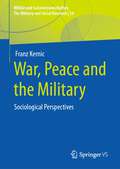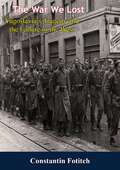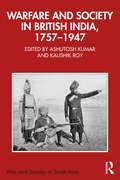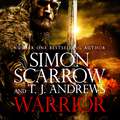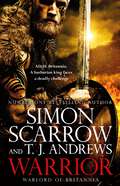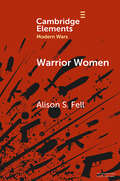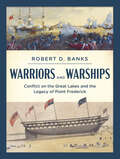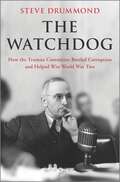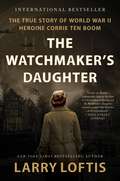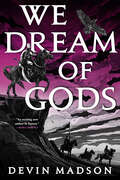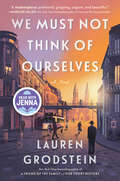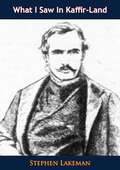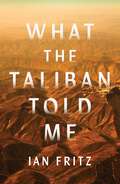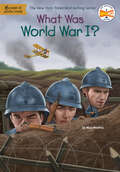- Table View
- List View
The War Begins in Paris: A Novel
by Theodore WheelerFrom the author of Kings of Broken Things and In Our Other Lives comes a "powerful, immersive" literary noir about two female World War II correspondents whose fates intertwine in Europe (Caitlin Horrocks). Paris, 1938. Two women meet: Mielle, a shy pacifist and shunned Mennonite who struggles to fit in with the elite cohort of foreign correspondents stationed around the city; the other, Jane, a brash, legendary American journalist, who is soon to become a fascist propagandist. When World War II makes landfall in the City of Lights, Mielle falls under Jane&’s spell, growing ever more intoxicated by her glamour, self-possession, and reckless confidence. But as this recklessness devolves into militarism and an utter lack of humanity, Mielle is seized by a series of visions that show her an inescapable truth: Jane Anderson must die, and Mielle must be the one to kill her. Structured as a series of dispatches filed from around Europe and based on the misadventures of a real journalist-turned-Nazi mouthpiece, The War Begins in Paris is a cat-and-mouse suspense that examines the relentlessness of propaganda, the allure of power, and how far one woman will go for the sake of her morality.
The War Born: Seven Forges, Book VI
by James A MooreThe final episode from the Seven Forges series!A final battle against the Wellish Overlords for the date of the empire takes place as their army of War-Born nightmares rages across Fellein.---The Overlords have risen!They've torn apart the Wellish Steppes and raised mountains, they're fighting against the gods themselves, attacking the Daxar Taaalor and bringing the wrath of the Children of the Forges. They've turned one of the greatest sorcerers in the history of Fellein to their side and divided the council of wizards, forcing Desh Krohan into battle with old allies. The empire is at war.The Sa'ba Taalor are preparing for battle, and the Overlords have begun their own plans, raising an army of shapechangers called the War-Born to do their bidding. The armies of the Overlords are savage, they hunt, kill and eat their prey. They are endlessly hungry.The final war is on, one that will change the shape of the Fellein Empire. Even as the gods involve themselves in the final confrontations between the empire and the enemies, old and new. File Under: Fantasy [ Last Stand | The Battle Persists | Rising Enemy | Cold Front ]
War Cry: The gripping 13th century medieval adventure for fans of Matthew Harffy and Elizabeth Chadwick (de Norton trilogy)
by Ian RossSir Adam de Norton gained his knighthood and his lands for fighting for de Montfort at Lewes. Now de Montfort calls in that debt and Adam must once more in this gripping historical adventure.1265 England has a new master. Simon de Montfort's victory at the Battle of Lewes has made him king in all but name. He has vowed to restore the rights and liberties of the kingdom, but now even his friends grow wary of his power. As old alliances break down, new rebellions gather strength. The captive king's supporters muster, vowing to overthrow the new regime. Meanwhile Adam de Norton, who won the honour of knighthood on the field at Lewes, has reclaimed his ancestral lands. A peaceful and prosperous future lies before him - until he receives a summons he cannot refuse. War is inevitable. But this time, will Adam be on the winning side?(c) 2023 Hodder & Stoughton Limited
War Cry: The gripping 13th century medieval adventure for fans of Matthew Harffy and Elizabeth Chadwick (de Norton trilogy)
by Ian Ross1265 England has a new master. Simon de Montfort's victory at the Battle of Lewes has made him king in all but name. He has vowed to restore the rights and liberties of the kingdom, but now even his friends grow wary of his power. As old alliances break down, new rebellions gather strength. The captive king's supporters muster, vowing to overthrow the new regime. Meanwhile Adam de Norton, who won the honour of knighthood on the field at Lewes, has reclaimed his ancestral lands. A peaceful and prosperous future lies before him - until he receives a summons he cannot refuse. War is inevitable. But this time, will Adam be on the winning side?
War Cry: The gripping 13th century medieval adventure for fans of Matthew Harffy and Elizabeth Chadwick (de Norton trilogy)
by Ian Ross1265 England has a new master. Simon de Montfort's victory at the Battle of Lewes has made him king in all but name. He has vowed to restore the rights and liberties of the kingdom, but now even his friends grow wary of his power. As old alliances break down, new rebellions gather strength. The captive king's supporters muster, vowing to overthrow the new regime. Meanwhile Adam de Norton, who won the honour of knighthood on the field at Lewes, has reclaimed his ancestral lands. A peaceful and prosperous future lies before him - until he receives a summons he cannot refuse. War is inevitable. But this time, will Adam be on the winning side?
The War in Burma 1943-1944: (WW2 #10) (The Ladybird Expert Series #16)
by James HollandBOOK 10 OF THE LADYBIRD EXPERT HISTORY OF THE SECOND WORLD WAR, FROM AWARD-WINNING HISTORIAN JAMES HOLLANDFeaturing stunning illustrations from Keith Burns, bringing the story to life in vivid detailWhy were British troops in Burma?What was The Defence of the Admin Box?How did the British defeat the Japanese troops?THE BURMA CAMPAIGN was one of the most prolonged campaigns in the South-East Asian theatre of war, but it was also one of the most dramatic.Against Japanese troops, and monsoon weather, the Allies finally prevailed, demonstrating to the world that the Axis powers could be defeated in the East.BRITAIN'S TURNING POINT IN THE WAR IN THE EASTWritten by historian, author and broadcaster James Holland, The War in Burma is an essential, accessible introduction to Britain's triumph in the East.__________Discover the full Ladybird Expert WW2 series:BlitzkriegThe Battle of BritainBattle of the AtlanticThe Desert WarThe Eastern FrontThe Pacific WarThe Bomber WarThe War in ItalyThe Battle for NormandyThe War in BurmaVictory in EuropeVictory Against Japan
War Memory and East Asian Conflicts, 1930–1945 (Entangled Memories in the Global South)
by Eveline Buchheim Jennifer CoatesThis book explores how narratives, exhibitions, media representations, and cultural heritage sites that communicate memories of conflicts in East Asia between 1930 and 1945 spread, interact, and are re-packaged for post-war audiences across national divisions. The contributors examine individual case studies of grassroots engagement with war memory, and collectively demonstrate the necessity of remaining aware of the researcher as participating in another kind of engagement with war memory. Contributions showcase a number of ways of doing research on war memory, alongside case studies from diverse regions of the world. Taken together, they bring a fresh perspective to scholarship on war memory, which has tended to focus on space, text, exhibition, or personal narrative, rather than bringing these elements into dialogue with one another.
The War of American Independence, 1763-1783: Falling Dominoes (Warfare and History)
by Stanley D. Carpenter Kevin J. Delamer James R. McIntyre Andrew T. ZwillingThe War of American Independence, 1763–1783: Falling Dominoes addresses the military, maritime and naval, economic, key personalities, key societal groups, political, imperial rivalry, and diplomatic dynamics and events from the post-Seven Years’ War era in Great Britain’s North American colonies through the end of the War of American Independence. Beginning in 1763 and moving through the war chronologically, the authors argue that British political and strategic leaders failed to develop an effective strategy to quell the discontent and subsequent revolt in the North American colonies and thus failed to restore allegiance to the Crown. This book describes and analyzes events and the outcomes of central players’ decisions—the British North American colonies, Great Britain, France, Spain, and the Dutch Republic—and the resultant actions. It examines events through the thematic lens of strategy, political and military leadership, public attitudes, economics, international rivalries and relations, and the role of traditionally less-considered groups: women, slaves, and Native American peoples. This book is an enlightening and essential read for all history students, from high school through to those on postgraduate courses, as well as those with an interest in the American Revolution.
War on the Ballot: How the Election Cycle Shapes Presidential Decision-Making in War
by Andrew PayneThe president of the United States is at once holder of the highest elected office and commander in chief of the armed forces. How do upcoming elections influence presidents’ behavior during wartime? How do presidents balance perceptions of the national interest with personal political interests?War on the Ballot examines how electoral politics shaped presidential decisions on military and diplomatic strategy during the wars in Korea, Vietnam, and Iraq. Drawing on a wealth of declassified documents and interviews with senior officials and military officers, Andrew Payne reveals the surprisingly large role played by political considerations during conflicts. He demonstrates how the exigencies of the electoral cycle drove leaders to miss opportunities to limit the human and financial costs of each war, gain strategic advantage, or sue for peace, sometimes making critical decisions with striking disregard for the consequences on the ground. Payne emphasizes the importance of electoral pressures throughout the full course of a conflict, not just around the initial decision to intervene. He shows how electoral constraints operate across different phases of the political calendar, going beyond the period immediately preceding a presidential election.Offering a systematic analysis of the relationship between electoral politics and wartime decision-making, this book raises crucial questions about democratic accountability in foreign policy.
War, Peace and the Military: Sociological Perspectives (Militär und Sozialwissenschaften/The Military and Social Research #56)
by Franz KernicThis book is a comprehensive analysis of the various social science approaches to explaining and interpreting war, peace and the military. Its central aim is to trace and reconstruct those basic assumptions constructed and 'thought processes' undertaken by modern social sciences in their research and conceptualization of military violence and the use of force. In addition to such reconstruction, the aim is also to enquire into the preconditions of such thought. This study therefore eschews the development of an explicit 'strategy' (in the sense of a research strategy), but instead is much more concerned with thinking about its subject matter by means of re-thinking and reflecting upon different theoretical approaches and problems. The investigation includes a critical reexamination of the tradition of military-sociological research from the beginning of modern sociology to late-twentieth century theoretical approaches regarding the security-focused and/or war-driven aspects of modern society.
The War We Lost: Yugoslavia's Tragedy and the Failure of the West
by Constantin FotitchIn the history of this century the Balkans, boundary between the East and the West, assume an importance far out of proportion to their geographical extent and the size of their population. The key spot in this troubled, conflict-ridden area is Yugoslavia. Here (in what was then Serbia) World War I began. Here the Hitler-Stalin alliance disintegrated. Here, during World War II, an angry popular revolution against a government committed to appeasement of Hitler, and the resistance which followed, delayed the German attack on Russia by six weeks, and according to official and authoritative German estimates, cost the Nazis the war. Here the Western Allies, guided by opportunistic political considerations rather than the principles which they had laid down in the Atlantic Charter, made one of the greatest mistakes of the war by shifting their support from Mihailovich to Tito. Here lie some of the gravest causes of post-war disagreement between the United States and Russia. Here international communism originally set up headquarters for the Cominform. Here, at the end of June 1948, occurred the first serious split between Soviet Russia and one of her satellite states. And here are some of the seeds of dissension from which World War III may be born.It is the purpose of this book to explain how these things happened by presenting the history of Yugoslavia during World War II and telling the story of the ordeal of the Serbian people and the price they paid for remaining faithful to their traditions of freedom and their loyalty to the Western democracies.
Warfare and Society in British India, 1757–1947 (War and Society in South Asia)
by Ashutosh Kumar Kaushik RoyThis book explores the intricate and intimate relationship between military organization, imperial policy, and society in colonial South Asia. The chapters in the volume focus on technology, logistics, and state building. The present volume highlights the salient features of expansion and consolidation of imperial control over the subcontinent, and ultimate demise of the Raj. Further, it turns the spotlight on to subaltern challenges to imperialism as well as the role of non-combatants in warfare. The volume: • Deals with both conventional and guerrilla conflicts and focuses on the frontiers (both North-West and North-East, including Burma); • Looks at the army as an institution rather than present a chronological account of military operations, which highlights the complex and tortuous relationship between combat institution, colonial state, and Indian society; • Integrates top-down approaches in military and strategic studies with the bottom-up perspectives and discusses on how the conduct of war (organisation and technology) is related to the economic, societal, and cultural impact of war. A rich account of the British ‘Army in India’, this book will be essential reading for scholars and researchers of South Asian history, military history, political history, colonialism, and the British Empire.
Warrior: The epic story of Caratacus, warrior Briton and enemy of the Roman Empire… (Warrior)
by Simon ScarrowFrom the bestselling author of the Eagles of the Empire novels comes the epic story of Caratacus: a barbarian who united tribes to raise an army against mighty Rome . . .The Romans invaded Britannia in AD 43 confident of victory. They swept through a divided and ill-equipped enemy, scattered across tough terrain. But one man was not prepared to surrender. Caratacus - quick-witted youngest son of a a tribal king - had been trained from birth to be a warrior of power and grit. Sent to be schooled by the Druids in his boyhood, his training meant that an already strong and cunning prince returned to his father's kingdom as a war machine . . .With Caratacus driving them forward, the tribes prepare to repulse an enemy anticipating an easy victory. Fighting not only to stay alive but for their very way of life, these men form a mighty force. The battle is on!The brand new series from the Sunday Times bestselling authors of Invader and Pirata: Warrior, the story of Britannia's barbarian warlord Caratacus.(p) 2023 Headline Publishing Group Ltd
Warrior: The epic story of Caratacus, warrior Briton and enemy of the Roman Empire…
by Simon ScarrowAD 18, Britannia.The Roman Empire rules much of the known world. Beyond the northern frontier lies Britannia, where ceaseless feuding amongst the Celts leaves the island vulnerable to Rome's ambitions.Caratacus, son of a powerful king, has no premonition of destiny when he is dispatched to train with the Druids. A brutal regime transforms the young prince into a warrior with unparalleled military skills - and the strategic cunning essential to outwit a stronger enemy.Nothing can prepare a man for the vicious reality of war. When Caratacus's father takes a stand against aggressive neighbouring tribes, the combat exercises are over; this is a fight to the death. Only the most ruthless of tactics offer any hope of victory. But Caratacus, and the loyal comrades willing to ride with him into hostile terrain, are ready to do whatever it takes - and endure any hardship - to defeat those set on destroying their kingdom . . .As mayhem and carnage spread across the land, everywhere can be felt the malign influence of Rome. Even if the battle is won, conflict with the Empire lies ahead.The brand new series from the Sunday Times bestselling authors of Invader and Pirata: Warrior, the story of Britannia's barbarian warlord Caratacus.Originally published in 5 ebook novellas
Warrior: The epic story of Caratacus, warrior Briton and enemy of the Roman Empire…
by Simon ScarrowAD 18, Britannia.The Roman Empire rules much of the known world. Beyond the northern frontier lies Britannia, where ceaseless feuding amongst the Celts leaves the island vulnerable to Rome's ambitions.Caratacus, son of a powerful king, has no premonition of destiny when he is dispatched to train with the Druids. A brutal regime transforms the young prince into a warrior with unparalleled military skills - and the strategic cunning essential to outwit a stronger enemy.Nothing can prepare a man for the vicious reality of war. When Caratacus's father takes a stand against aggressive neighbouring tribes, the combat exercises are over; this is a fight to the death. Only the most ruthless of tactics offer any hope of victory. But Caratacus, and the loyal comrades willing to ride with him into hostile terrain, are ready to do whatever it takes - and endure any hardship - to defeat those set on destroying their kingdom . . .As mayhem and carnage spread across the land, everywhere can be felt the malign influence of Rome. Even if the battle is won, conflict with the Empire lies ahead.The brand new series from the Sunday Times bestselling authors of Invader and Pirata: Warrior, the story of Britannia's barbarian warlord Caratacus.Originally published in 5 ebook novellas
Warrior Women: The Cultural Politics of Armed Women, c.1850–1945 (Elements in Modern Wars)
by Alison S. FellThis Element examines women warriors as vehicles of mobilisation. It argues that women warrior figures from the mid-nineteenth century until the end of the Second World War are best understood as examples of 'palimpsestic memory', as the way they were represented reflected new contexts while retaining traces of legendary models such as Joan of Arc, and of 'travelling memory', as their stories crossed geographical borders and were re-told and re-imagined. It considers both the instrumentalisation of women warriors by state actors to mobilise populations in the world wars, and by non-state actors in resistance, anti-colonial and feminist movements. Fell's analysis of a broad range of global conflicts helps us to understand who these actors were, what motivated them, and what meanings armed women embodied for them, enabling a fresh understanding of the woman warrior as an archetype in modern warfare.
Warriors and Warships: Conflict on the Great Lakes and the Legacy of Point Frederick
by Robert D. BanksThe untold story of Point Frederick, where early nineteenth-century Canadians built warships that stopped invasion and brought peace.Warriors and Warships brings to life a much neglected part of Canada’s military history, covering the warships and the people who built them at Point Frederick from the late eighteenth century to the mid-nineteenth century. Opposite Kingston, Point Frederick was the 1789 dockyard home of the Provincial Marine on Lake Ontario and the headquarters of Britain’s Royal Navy from 1813 to 1853. Today, it is the home of the Royal Military College of Canada. In this detailed narrative, with over one hundred colour archival maps, aerial views, photographs, and 3D reconstructions, Banks recounts Point Frederick’s building of great sail and steam warships and the roles these vessels played in conflict on Lake Ontario, the St. Lawrence River, and Niagara. Among the conflicts is the War of 1812, when French Canadian and British shipwrights made warships that forced the U.S. Navy into port and led to the American withdrawal from Canada. Banks also covers the role of the ships in the settlement of Upper Canada, the rebellion of 1837, the early planning of the Rideau Canal, and the beginning of the undefended border. Along the way, Banks introduces an array of people from Upper Canada, such as Lieutenant Governor John Graves Simcoe and his wife, Elizabeth Posthuma; Governor General Lord Dorchester; General Isaac Brock; Sir James Yeo, and even Charles Dickens. He also describes the day-to-day activities at Point Frederick, beyond shipbuilding and military campaigns, such as skating parties, sleigh rides, theatricals, disease and death, and crime and punishment. Banks shares the moments of hardship, triumph, and tragedy of both the warriors and the warships in this important contribution to Canadian history.
The Watchdog: How the Truman Committee Battled Corruption and Helped Win World War Two
by Steve DrummondThe story of how a little-known junior senator fought wartime corruption and, in the process, set himself up to become vice president and ultimately President Harry Truman. Months before Pearl Harbor, Franklin D. Roosevelt knew that the United States was on the verge of entering another world war for which it was dangerously ill-prepared. The urgent times demanded a transformation of the economy, with the government bankrolling the unfathomably expensive task of enlisting millions of citizens while also producing the equipment necessary to successfully fight—all of which opened up opportunities for graft, fraud and corruption. In The Watchdog, Steve Drummond draws the reader into the fast-paced story of how Harry Truman, still a newcomer to Washington politics, cobbled together a bipartisan team of men and women that took on powerful corporate entities and the Pentagon, placing Truman in the national spotlight and paving his path to the White House. Drawing on the largely unexamined records of the Truman Committee as well as oral histories, personal letters, newspaper archives and interviews, Steve Drummond—an award-winning senior editor and executive producer at NPR—brings the colorful characters and intrigue of the committee&’s work to life. The Watchdog provides readers with a window to a time that was far from perfect but where it was possible to root out corruption and hold those responsible to account. It shows us what can be possible if politicians are governed by the principles of their office rather than self-interest.
The Watchmaker's Daughter: The True Story of World War II Heroine Corrie ten Boom
by Larry LoftisNew York Times bestselling author and master of nonfiction spy thrillers Larry Loftis writes the first major biography of Corrie ten Boom, a Dutch watchmaker who saved the lives of hundreds of Jews during WWII—at the cost of losing her family and being sent to a concentration camp, only to survive, forgive her captors, and live the rest of her life as a Christian missionary.The Watchmaker’s Daughter is one of the greatest stories of World War II that readers haven’t heard: the remarkable and inspiring life story of Corrie ten Boom—a groundbreaking, female Dutch watchmaker, whose family unselfishly transformed their house into a hiding place straight out of a spy novel to shelter Jews and refugees from the Nazis during Gestapo raids. Even though the Nazis knew what the ten Booms were up to, they were never able to find those sheltered within the house when they raided it.Corrie stopped at nothing to face down the evils of her time and overcame unbelievable obstacles and odds. She persevered despite the loss of most of her family and relied on her faith to survive the horrors of a notorious concentration camp. But even more remarkable than her heroism and survival was Corrie’s attitude when she was released. Miraculously, she was able to eschew bitterness and embrace forgiveness as she ministered to people in need around the globe. Corrie’s ability to forgive is just one of the myriad lessons that her life story holds for readers today.Reminiscent of Schindler’s List and featuring a journey of faith and forgiveness not unlike Unbroken, The Watchmaker’s Daughter is destined to become a classic work of World War II nonfiction.
We Dream of Gods (The Reborn Empire #4)
by Devin MadsonIn this "complex tale of war, politics, and lust for power" (The Guardian), the fate of the world is decided when heroes and gods march into battle one last time in the searing conclusion of this bold and bloody epic fantasyseries.There are no gods. Only men. Betrayed by her closest allies, Empress Miko Ts&’ai is thrust from ruler to pawn. But she won&’t suffer the whims of men. A string of dangerous gambles could win Miko her empire for good, but to take back the throne, she must become everything her ancestors failed to be. Rah e&’Torin leads a herd again. Now he seeks to honor a promise he made a lifetime ago—to safely bring his Swords home. Yet Rah&’s loyalty to the past may be his ultimate undoing. Cassandra Marius is lost. Ensnared by memories that aren&’t her own, Cass must decide who she really is, but the answer lies beyond one final confrontation with Leo Villius. And trapped in the heart of the Chiltaen army, Dishiva e&’Jaroven is handed unexpected power. The dream of a new homeland is within her grasp—if she risks everything and trusts her former enemies. Praise for The Reborn Empire: "Imaginative worldbuilding, a pace that builds perfectly to a heart-pounding finale and captivating characters. Highly recommended." —John Gwynne, author of The Shadow of the Gods "An exciting new author in fantasy." —Mark Lawrence, author of Red Sister The Reborn EmpireWe Ride the StormWe Lie with DeathWe Cry for Blood We Dream of Gods For more from Devin Madson, check out: The Vengeance TrilogyThe Blood of WhisperersThe Gods of ViceThe Grave at Storm's End
We Must Not Think of Ourselves: A Novel
by Lauren Grodstein**THE TODAY SHOW READ WITH JENNA DECEMBER 2023 PICK** Inspired by a little-known piece of history—the underground group that kept an archive to ensure that the lives of Jewish occupants of the Warsaw Ghetto in World War II were not lost to history—this is a heart-wrenching novel of love and defiance that People calls "gripping, emotional, and against all odds, hopeful."&“This book is a masterpiece: profound, gripping, urgent, and beautiful.&” —Madeline Miller, New York Times bestselling author of Circe and The Song of Achilles On a November day in 1940, Adam Paskow becomes a prisoner in the Warsaw Ghetto, where the Jews of the city are cut off from their former lives and held captive by Nazi guards to await an uncertain fate. Weeks later, he is approached by a mysterious figure with a surprising request: Would he join a secret group of archivists working to preserve the truth of what is happening inside these walls? Adam agrees and begins taking testimonies from his students, friends, and neighbors. He learns about their childhoods and their daydreams, their passions and their fears, their desperate strategies for safety and survival. The stories form a portrait of endurance in a world where no choices are good ones. One of the people Adam interviews is his flatmate Sala Wiskoff, who is stoic, determined, and funny—and married with two children. Over the months of their confinement, in the presence of her family, Adam and Sala fall in love. As they desperately carve out intimacy, their relationship feels both impossible and vital, their connection keeping them alive. But when Adam discovers a possible escape from the Ghetto, he is faced with an unbearable choice: whom can he save, and at what cost ? Inspired by the testimony-gathering project with the code name Oneg Shabbat, New York Times bestselling author Lauren Grodstein draws readers into the lives of people living on the edge. Told with immediacy and heart, We Must Not Think of Ourselves is a piercing story of love, determination, and sacrifice.
What I Saw In Kaffir-Land
by Stephen Lakeman“The nineteenth century wars against the Xhosa tribes of South Africa could be as savage as any fought and there can be little doubt that imperial powers could use methods verging on genocide when they decided to take over the lands and resources of underdeveloped people. Equally, a savage foe inevitably fought a savage war and Kaffir and Zulu warriors were not given to taking prisoners. This book is by and concerns the experiences of Steven Lakeman in the wars by the British crown and settlers against the Kaffir tribes in Cape Colony in the 1850s. Lakeman was a mercenary adventurer, soldier and administrator, and it was widely recognised that his command, the Waterkloof Rangers, waged war in a fashion brutal to the point of criminality by modern standards. Some of his matter of fact statements concerning the activities of his men-and indeed his own actions-will be troubling to contemporary sensibilities, while being essential reading for those who wish to understand both the events reported and those who took part in them. Lakeman was knighted by Queen Victoria in 1853. He went on to play a pivotal role in the Victorian age both in war and as a diplomat. He was one of the earliest proponents for the discontinuation of the iconic scarlet uniform of the British soldier and its replacement with khaki and he campaigned vigorously for the introduction of the Minie rifle to replace smooth bore muskets.”-Print ed.
What the Taliban Told Me
by Ian FritzAn &“essential&” (Kevin Maurer, #1 New York Times bestselling author) memoir of a young Air Force linguist coming-of-age in a war that is lost.When Ian Fritz joined the Air Force at eighteen, he did so out of necessity. He hadn&’t been accepted into colleges thanks to an indifferent high school career. He&’d too often slept through his classes as he worked long hours at a Chinese restaurant to help pay the bills for his trailer-dwelling family in Lake City, Florida. But the Air Force recognizes his potential and sends him to the elite Defense Language Institute in Monterey, California, to learn Dari and Pashto, the main languages of Afghanistan. By 2011, Fritz was an airborne cryptologic linguist and one of only a tiny number of people in the world trained to do this job on low-flying gunships. He monitors communications on the ground and determines in real time which Afghans are Taliban and which are innocent civilians. This eavesdropping is critical to supporting Special Forces units on the ground, but there is no training to counter the emotional complexity that develops as you listen to people&’s most intimate conversations over the course of two tours, Fritz listens to the Taliban for hundreds of hours, all over the country night and day, in moments of peace and in the middle of battle. What he hears teaches him about the people of Afghanistan—Taliban and otherwise—the war, and himself. Fritz&’s fluency is his greatest asset to the military, yet it becomes the greatest liability to his own commitment to the cause. Both proud of his service and in despair that he is instrumental in destroying the voices that he hears, What the Taliban Told Me is a &“fraught, moving&” (Kirkus Reviews) coming-of-age memoir and a reckoning with our twenty years of war in Afghanistan.
What Was World War I? (What Was?)
by Nico Medina Who HQThis compelling addition to the What Was? series covers what was supposed to be &“the war to end all wars&” but tragically wasn't.In 1914, the assassination of an Austrian archduke set off a disastrous four-year-long conflict involving dozens of countries with battles taking place in all parts of the world. World War I was the first to use planes and tanks as well as deadly gases that left soldiers blinded or &“shell shocked&” (a condition now called Post Traumatic Stress Syndrome). There were battles that lasted for months with opposing troops fighting from rat-infested trenches, battles that often ended in a hollow victory with only a small area of land retaken. The author of many successful Who HQ titles Nico Medina gives young readers a clear and compelling account of this long and tragic event, a war that left over 20 million dead and was the lead-up to World War II barely twenty years later.
When China Attacks: A Warning to America
by Grant NewshamWhen China Attacks is a fire bell in the night—a warning about a war that we are already losing. It offers a frightening, and well-founded, blow-by-blow account of what might happen next.China poses an existential threat to America, warns a veteran intelligence officer, and the window for an effective response is closing fast. Col. Grant Newsham, a former reserve head of intelligence for Marine Forces Pacific, delivers a blow-by-blow account of how the threat has developed, from the growing skill and belligerence of the Chinese military to gray-zone campaigns to hollow out America&’s will to resist. These efforts that have now reached fruition. You can see the war damage in Baltimore, Erie, Buffalo, and countless other communities across the United States. With decades of experience in Asia, including as a U.S. Marine, a diplomat, and an executive with Morgan Stanley and Motorola in Japan, Col. Newsham brings together the military, political, economic and social to provide insights into how far along we already are, and what needs to be done. Now. The question is not whether the Chinese will attack. They already have. It is trying to kill our economy, our institutions, our way of life, our people. It is dominant in the world economy. It is a master of intellectual property theft. It shows strategic genius at cornering essential markets. It has been staggeringly successful in buying influence among American elites. It is killing us with Fentanyl. And its military buildup is astonishing. So far, China has been waging a mostly covert war on the United States and its allies. But, emboldened by American weakness and perceived decline, the war could soon explode into the open. The flashpoint will be Taiwan—but the war will extend over the entire Pacific Theater and beyond. The results—as Col. Newsham paints in stark detail—will be devastating. America risks a humiliating retreat, with almost unimaginable costs to our economy and security. Will America fight back before the cold war that Communist China is waging against America and its allies goes hot? The conflict is coming. We&’re not ready. China is already attacking America. Is American defeat inevitable? No, but we must change course immediately. And to do that, we must wake up and heed the sobering message of When China Attacks.
